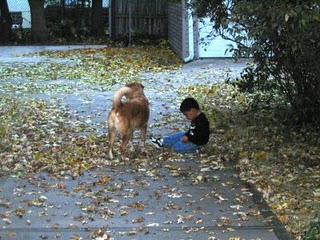

Who are you?
I was running through the neighborhood. Up ahead was a small boy playing by himself in a driveway. He stared at me intently and as I ran by, he called out a question, “Who are you?”
Who am I, indeed. How do you begin to answer a question like that? Am I the set of roles I fulfill? Belief…
By Seth Barnes
 I was running through the neighborhood. Up ahead was a small boy playing by himself in a driveway. He stared at me intently and as I ran by, he called out a question, “Who are you?”
I was running through the neighborhood. Up ahead was a small boy playing by himself in a driveway. He stared at me intently and as I ran by, he called out a question, “Who are you?”Who am I, indeed. How do you begin to answer a question like that? Am I the set of roles I fulfill? Beliefs I hold? Am I the sum of my preferences, interests, and experiences? And what does God think about me (since he thought me up in the first place)?
Of course I’m all these things and more. Perhaps the question was surprising for its source ( a small boy), but also because we ask it so rarely of ourselves and one another. We tend to drift through our lives without pausing to really reflect on either who we’ve become or if we’re progressing according to design.
Yes, there are things about ourselves we can’t change – our background, our height, our skin color. But so much of who we are is a function of choice. In between the events and sensations we experience and the way we respond is what is known as “liminal space.” It is the place in our lives where we get to exercise our freedom and volitionally answer the question, “Who am I?”
When I operate out of habit or without considering alternatives, liminal space may be so small that it is in fact subliminal. And, to the degree that I have little liminal space, my identity may largely be a closed issue. I may live in America, the land of the free, but I may in fact no longer be free.
Most of us have far more liminal space available to us than we recognize. People reinvent themselves well into old age. Scoffers become believers and selfish people become considerate.
So, who are you?
Do yourself a favor and begin reflecting more on the choices you have. Think before you act. Reflect after you act. Journal more. Consider who you’re becoming. Begin living on purpose.



I had truly forgotten about liminal space until reading your blog, i realized i was in one while on my mission trip..but since then i forgot all about it. thank you for the reminder and the challenge to living intentionally.
What a pithy yet penetrating post. I know through the years there have been many social settings (particularly with men) and invariably the question “Who are you?” is answered with “Here is what I do?”
Community and the formation of an authentic tribe happens when members are willing to linger in the examing room of God’s graceful and persistent queries regarding heart and soul.
My answer would be this:
“I’m a broken man finding healing in the truth that God cares and has a unique and redemptive plan for my life knowing that what I do with my time, talent and treasure today makes all the difference in an eternity I am certain of.”
Appreciate you Seth.
Some of us have had the honor of the LORD telling us who we are. I would rather live from there than mans opinion of who I am.Sometimes I forget who Jesus says I AM in him,in me i need to make sign and hang it where ILL see it first thing in the morning and last thing at night.More of my prayer life needs to be focused on my identity from his perspective.
Hugh
Most of us put on a face every day of either: a.)I’m busy, or b.)I’m here for you. Talk to me.
We make that choice every morning, and in every encounter we have with a live human being every day.
There is a way to make ourselves available to people without sacrificing goals or objectives or scheduled obligations. Quite often it involves simply smiling.
The joy of the Lord is our strength.
Not that I’m walking in this revelation or anything, but it’s a principle worth considering when analyzing liminalities.
hi, i’m katie “christ” rowland.